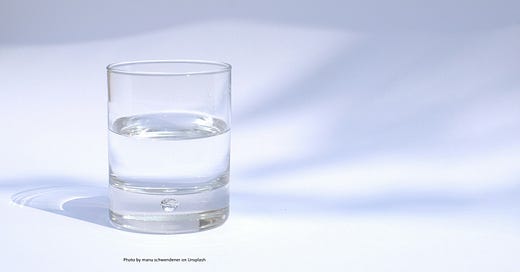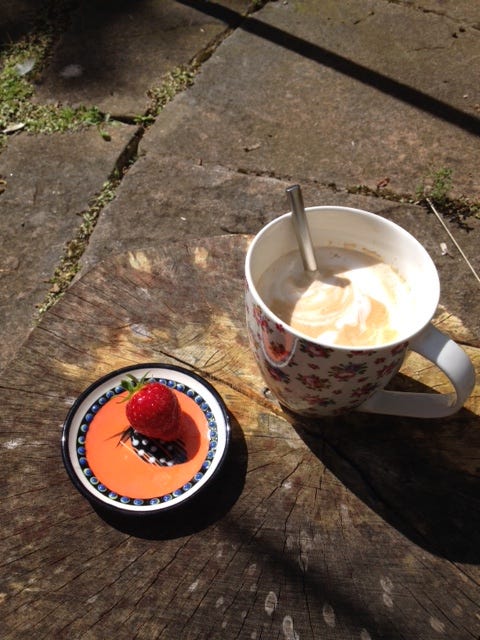I used to talk about filling your well of wellbeing. A while ago, I decided that a “well” is not a terribly relevant image for modern life. Do children even know what a well is any more? So I started talking about the “glass of wellbeing” and would give advice about making sure there was enough in it.
A glass of wellbeing is a nice image. Doesn’t matter whether you call it a glass half full or half empty: the point is to make sure there is enough in it at any one time. (I’ll talk about how below.) And to notice when it is nearly empty. It doesn’t need to be full, just not empty. Adding water to it is easy as long as you remember to do it. It’s a refreshing image, healthy and life-giving.
Another good and relevant image for the modern age would be “recharging your battery”. We’re all too familiar with the need to recharge batteries, whether phones or doorbells or headphones or whatever. We know that certain actions drain batteries faster than others; we know that some batteries recharge more easily or faster than others; and we know that a battery that has only a weak charge in it works less well than a well-charged one. And we know that batteries drain faster or slower depending on the conditions they are working in.
We have used the phrase “I’m recharging my batteries” for a long time, to mean that we’re taking a break or doing something to make ourselves feel and work better.
I started thinking about this because I recently switched from a simple Fitbit to a much more complex Garmin exercise and health tracker. The Garmin tells me about my “body battery”, measuring how full/empty it is, based on a combination of factors such as: my sleep (length and quality), how much exercise I’ve done, how stressed it thinks I have been and a few other things. I’m not naive enough to think that this is super-accurate but a) I think it’s relatively accurate and b) it does tend to reflect how I’m actually feeling and how fast/far I’m able to run, for example.
But I think the most important messages that this body battery measurement have for me are that:
Things I do, many of which are in my control, make a difference to my energy levels, how I feel and how well I function.
By being conscious of this (not necessarily with an exercise tracker) I can make good choices and recharge my body battery.
What can we DO about our body battery? Or our glass of wellbeing?
Three things (all are necessary):
Understand what drains and what fills the glass / battery
Be self-aware - how full is it?
Take action to replenish when necessary
Let me explain, so you can explain to your young people or your friend who needs it.
(PS I recommend eating more than one strawberry…)
1. Understand what drains and what fills the glass / battery
What drains?
Any negative mental experience. This could be something small (such as an undermining comment or thought) or something big (such as failing a test; having a major disappointment or facing a big sadness). It could be in your head and invisible to others or it something more outwardly obvious. It could be having a cold or a stomach-ache. It could be feeling cold, hungry or uncomfortable. It could be several days of horrible weather. It is anything that drags you down and makes you feel less good, less strong, less well. It is draining your mental energy.
Anything that burns physical energy. This is not so much mentally draining as physically draining. So, going for a run or doing a lot of schoolwork both burn actual energy, even if the schoolwork is all done sitting down. You might not think of physical activity as draining wellbeing but wellbeing IS about energy - physical and mental - and energy drains when it’s used. This is not a bad thing but it is a reminder that when you’ve burned energy you need to replace it.
What fills?
Any positive experience. The positive experiences counteract the negative. The more negative things have happened (see above) the more positive things you need to counteract them. (Ideas below.) Unfortunately, it’s often the case that negative things weigh more: so receiving one negative comment often needs more than one positive thing to make us feel better. Often, we have little control over whether positive or negative thing happens so we have to make an extra effort to build positive things into our life. (Below!)
Rest after burning energy. This is easier but we still have to remember to do it. My body battery report often tells me I’ve been too active or too stressed and it reminds me to rest.
2. Be self-aware - how full is it?
You don’t need a gadget! I definitely rely more on my brain than my gadget.
Simply check in on yourself - and get your teenagers to do the same - at least once a day, ideally when you get home from school or work. I suggest this because it gives you time to do some actions to help promote your sleep that night. And sleep is the best recharger.
Ask:
How much has my glass of wellbeing or my body battery been drained today?
Have I been very active? Or very stressed? Or both?
How was my sleep last night / recently?
Have I eaten well today?
What have I done too much/little of today? What healthy action has been missing from my day?
How do I feel, mentally and physically?
3. Take action to replenish when necessary
There are SO many things to choose from! I’ll suggest some below but first let me tell you my “rules”:
Pick something that will work for your specific need: if you’ve been overdoing exercise, pick something physically restful; if your sleep has been poor, pick something that will improve it; if you need different food choices, go for that; if you need something distracting, choose that.
Vary your choices: eating a peanut butter and banana sandwich could be a great choice but not if you do it many times a day! Instead go for a walk or do some relaxing yoga.
Try something new every now and then: try something you didn’t think would work and see if it does.
Whatever else you do, include at least one (and maybe many more) times when you take control of your breathing with a breathing exercise. Slow, low and soften is my motto: slow your breathing, take it lower in your body (focus on stomach/abdomen) and soften/relax the muscles of your abdomen. So relaxing - instead medicine! (Lots of breathing suggestions in my book No Worries.
Prioritise your night-time sleep. (See here for tips for that.)
Here are some random but great ideas for refilling your glass / recharging your body battery:
Ten minutes out - use it to do anything relaxing (ideally off-screen/device)
Walk round the block
Sit in the sun
Have a bath - with bubble bath if you like (I do!)
Light a scented candle and just watch it for a few minutes
Eat a nutritious snack
Make and drink a smoothie
Drink some cool water
Have a cup of tea
Spend time on a hobby
Any physical exercise
Some yoga stretches
Have a laugh
Draw or doodle
Do your favourite breathing exercise
Or grounding exercise (see No Worries)
Spend time with a friend
Read a book
Do a puzzle
Sow some seeds
Find a recipe and offer to cook it for your family
Bake a cake
Plan something fun for the weekend
Meditate
Make yourself a delicious iced drink
Look at photos from a happy time
Do a task that’s been hanging over your head
Tidy your desk or bedroom
Do a favour for someone else
Write a thank you note to someone
Massage hands or feet with hand cream
Give someone a hug
Give yourself a hug - make it a long one
Get a good night’s sleep tonight!
I’m sure you can think of more things. The point is: pick the ones that will work for you and do them enough. Then your glass will never be too empty and your body battery will keep you strong, successful and well.
That’s wellbeing! That’s a glass more than half full and a well-charged body battery.
Don’t forget to sign up for Understanding and Supporting Your Teenagers, my webinar for parents and teachers on April 30th. In that link you’ll find a 20% discount - valid till Mar 11th. Hurry!
Stay well, stay strong, stay on top. Keep that body battery charged.






